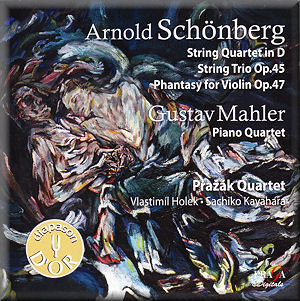|

Availability
CD: Praga
Digitals
|
Gustav MAHLER (1860-1911)
Piano Quartet in A minor (1876) [11:44]
Arnold SCHOENBERG (1874-1951)
String Quartet in D major (1897) [23:08]
String Trio, Op. 45 (1946) [19:07]
Phantasy for violin with piano accompaniment, Op. 47 (1949) [09:01]
 Pražák Quartet (Vaclav Remes (violin) (String Quartet, Trio); Vlastimil Holek (violin) (Piano Quartet, String Quartet, Phantasy); Josef Kluson (viola) (Piano Quartet, String Quartet, Trio); Michal Kanka (cello) (Piano Quartet, String Quartet, Trio)); Sachiko Kalahari (piano) (Piano Quartet, Phantasy)
Pražák Quartet (Vaclav Remes (violin) (String Quartet, Trio); Vlastimil Holek (violin) (Piano Quartet, String Quartet, Phantasy); Josef Kluson (viola) (Piano Quartet, String Quartet, Trio); Michal Kanka (cello) (Piano Quartet, String Quartet, Trio)); Sachiko Kalahari (piano) (Piano Quartet, Phantasy)
rec. 1-3 May 1994, Evangelic Church, Prague (String Quartet, Trio), 5-7 September 2001, Domovina Studio, Prague (Piano Quartet, Phantasy)
 PRAGA DIGITALS PRD/DSD 250168
PRAGA DIGITALS PRD/DSD 250168  [63:20]
[63:20] 
|
This Praga Digitals recording reissued on SACD offer four scores
recorded at two sessions. The Pražák bring together chamber
music of two key composers from the early twentieth century
Viennese milieu. Mahler was a major influence on the Second
Viennese School and especially for Schoenberg whose music
he championed. In turn Schoenberg after hearing a performance
of the Symphony No.3 developed a strong admiration for
Mahler’s work and ideals. In 1876 Mahler was a mere
16 year old when as a student at the Vienna Conservatory he
began writing his Piano Quartet in A major. Only the
first movement marked Nicht zu schnell (Not too fast)
was completed. It was Mahler’s only chamber score. Naturally
it shows influences of Schubert, Schumann, Dvorák and Brahms.
I fondly recall the music being used most effectively in the
soundtrack to Martin Scorsese’s 2010 psychological thriller
Shutter Island starring Leonardo DiCaprio. Alfred Schnittke
constructed a completion from some of the remaining material
but on this release the Pražák Quartet has recorded the original
incomplete. The three members of the Pražák Quartet with pianist
Sachiko Kalahari play with great feeling while increasing tension
simmers way. At 7:03-8:30 the surface calm feels slightly uneasy
and uncertain; evoking exhaustion rather than tranquillity.
Sadly the effect is compromised by an over-bright recording
that is far too closely recorded for my taste. A far better
played and recorded account is from the Beethoven Trio Vienna
on Camerata CM-567 (c/w Korngold Piano Trio, Schoenberg
Verklärte Nacht). Recorded in 1998 in Vienna there
is a sense of total involvement in the performance with some
beautiful atmospheric playing.
Schoenberg’s unpublished String Quartet in D major (1897)
is the first of his five string quartets. It exemplifies his
compositional prowess. Received with significant approval the
much revised four movement score was premiered in December 1898
at the Bösendorfer-Saal in Vienna by the Fitzner Quartet. This
splendid late-Romantic music is predominantly Brahmsian in inspiration
and form flecked with Dvorákian melodic influences. Even so,
the writing remains entirely original and genuinely Viennese.
Without any prior knowledge I wonder how many people would be
able to guess the identity of the composer.
The Dvorák folk element is immediately noticeable in the opening
of the Allegro molto with its refreshing and gusty rhythms
compellingly evocative of the outdoors. Often the writing suggests
the Dvorák String Quartet in F major ‘American’
composed some four years earlier. Evidently Dvorák’s works
were often programmed in Vienna at that time so echoes are not
too surprising. By contrast the Intermezzo is rather
restrained and has a propensity for cheerlessness offset by
understated appeal. The influence of Brahms is revealed by the
rich, warm textures of the Andante con moto - a diverse
set of variations with underlying tension. Jaunty Bohemian/Moravian
folk melodies permeate the final movement. Although not as pronounced
as in the Mahler Piano Quartet the close sound quality
glares somewhat. By some distance the finest performance I have
heard of the Schoenberg String Quartet in D major (1897)
is by the LaSalle Quartet magnificently recorded in 1968/70
at Munich. Played with a dramatic freshness and great polish
this account is included in a generous four disc set of chamber
music of the Second Viennese School on Brilliant
Classics 9016.
To a commission from Harvard University Schoenberg composed
the String Trio, Op. 45 in 1946. This was shortly after
he had suffered a near fatal heart-attack. This single movement
score has five distinct sections the first of which, titled
Part 1, is powered by a curious scurrying that
is full of nervous energy. The Pražák ensures that emotional
tension pervades the 1st Episode as if it depicted a
surge of forbidding electrical energy. Here one notices the
wide dynamic range. In Part 2 the warm romantic writing
is varied by a number of disagreeable and delirious outbursts.
Dissonance and high dynamics pervade the score. This is unfriendly
and unsettling music and I expected more intensity and anger
from the Pražák. The majority of material in Part 3 has
been reused in earlier sections with most of the aggression
having been smoothed away. For recordings of the Schoenberg
String Trio I have been consistently impressed by the
1988 account by members of the LaSalle Quartet on Deutsche Grammophon
‘20th-Century Classics’ 0289 423 2502 9 (c/w Verklärte
Nacht for String Sextet, Op.4). Walter Levin, Peter Kamnitzer
and Lee Fiser perform with refinement and vitality and offer
an impressive sense of spontaneity.
Composed in 1949 Schoenberg’s last instrumental work, the Phantasy
for violin with piano accompaniment, Op. 47 was premičred
in Zürich by violinist Francine Villers with Jacques Monod.
Holek and Kalahari hold things together splendidly amid the
twelve-tone complexities. The duo reveal the fascinating character
and rich variety of this often stark but by no means unemotional
score.
There is some fine playing here although I didn’t always have
a sense of the players being truly inside the music. In addition
the recorded sound does not always do the music any favours.
Three of these pieces already have highly desirable alternatives
available in the catalogues.
Michael Cookson
|












